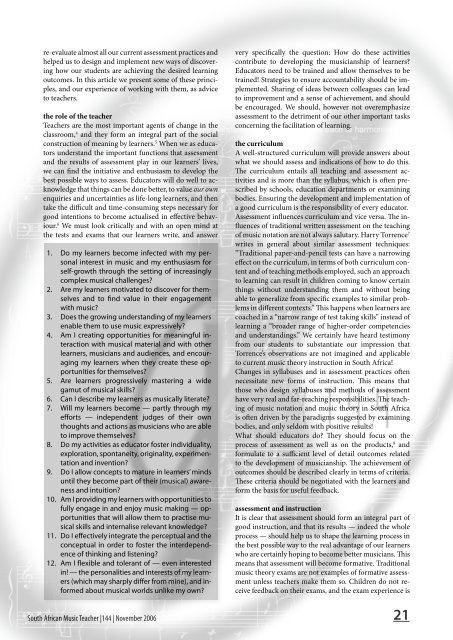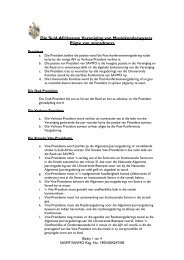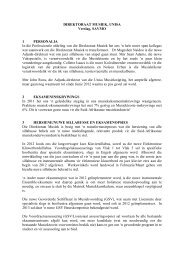2006 Edition 2 (Issue 144) - Sasmt-savmo.org.za
2006 Edition 2 (Issue 144) - Sasmt-savmo.org.za
2006 Edition 2 (Issue 144) - Sasmt-savmo.org.za
Create successful ePaper yourself
Turn your PDF publications into a flip-book with our unique Google optimized e-Paper software.
e-evaluate almost all our current assessment practices and<br />
helped us to design and implement new ways of discovering<br />
how our students are achieving the desired learning<br />
outcomes. In this article we present some of these principles,<br />
and our experience of working with them, as advice<br />
to teachers.<br />
the role of the teacher<br />
Teachers are the most important agents of change in the<br />
classroom, 4 and they form an integral part of the social<br />
construction of meaning by learners. 5 When we as educators<br />
understand the important functions that assessment<br />
and the results of assessment play in our learners’ lives,<br />
we can find the initiative and enthusiasm to develop the<br />
best possible ways to assess. Educators will do well to acknowledge<br />
that things can be done better, to value our own<br />
enquiries and uncertainties as life-long learners, and then<br />
take the difficult and time-consuming steps necessary for<br />
good intentions to become actualised in effective behaviour.<br />
6 We must look critically and with an open mind at<br />
the tests and exams that our learners write, and answer<br />
1.<br />
2.<br />
3.<br />
4.<br />
5.<br />
6.<br />
7.<br />
8.<br />
9.<br />
10.<br />
11.<br />
12.<br />
Do my learners become infected with my personal<br />
interest in music and my enthusiasm for<br />
self-growth through the setting of increasingly<br />
complex musical challenges?<br />
Are my learners motivated to discover for themselves<br />
and to find value in their engagement<br />
with music?<br />
Does the growing understanding of my learners<br />
enable them to use music expressively?<br />
Am I creating opportunities for meaningful interaction<br />
with musical material and with other<br />
learners, musicians and audiences, and encouraging<br />
my learners when they create these opportunities<br />
for themselves?<br />
Are learners progressively mastering a wide<br />
gamut of musical skills?<br />
Can I describe my learners as musically literate?<br />
Will my learners become — partly through my<br />
efforts — independent judges of their own<br />
thoughts and actions as musicians who are able<br />
to improve themselves?<br />
Do my activities as educator foster individuality,<br />
exploration, spontaneity, originality, experimentation<br />
and invention?<br />
Do I allow concepts to mature in learners’ minds<br />
until they become part of their (musical) awareness<br />
and intuition?<br />
Am I providing my learners with opportunities to<br />
fully engage in and enjoy music making — opportunities<br />
that will allow them to practise musical<br />
skills and internalise relevant knowledge?<br />
Do I effectively integrate the perceptual and the<br />
conceptual in order to foster the interdependence<br />
of thinking and listening?<br />
Am I flexible and tolerant of — even interested<br />
in! — the personalities and interests of my learners<br />
(which may sharply differ from mine), and informed<br />
about musical worlds unlike my own?<br />
South African Music Teacher |<strong>144</strong> | November <strong>2006</strong><br />
very specifically the question: How do these activities<br />
contribute to developing the musicianship of learners?<br />
Educators need to be trained and allow themselves to be<br />
trained! Strategies to ensure accountability should be implemented.<br />
Sharing of ideas between colleagues can lead<br />
to improvement and a sense of achievement, and should<br />
be encouraged. We should, however not overemphasize<br />
assessment to the detriment of our other important tasks<br />
concerning the facilitation of learning.<br />
the curriculum<br />
A well-structured curriculum will provide answers about<br />
what we should assess and indications of how to do this.<br />
The curriculum entails all teaching and assessment activities<br />
and is more than the syllabus, which is often prescribed<br />
by schools, education departments or examining<br />
bodies. Ensuring the development and implementation of<br />
a good curriculum is the responsibility of every educator.<br />
Assessment influences curriculum and vice versa. The influences<br />
of traditional written assessment on the teaching<br />
of music notation are not always salutary. Harry Torrence 7<br />
writes in general about similar assessment techniques:<br />
”Traditional paper-and-pencil tests can have a narrowing<br />
effect on the curriculum, in terms of both curriculum content<br />
and of teaching methods employed, such an approach<br />
to learning can result in children coming to know certain<br />
things without understanding them and without being<br />
able to generalize from specific examples to similar problems<br />
in different contexts.” This happens when learners are<br />
coached in a “narrow range of test taking skills” instead of<br />
learning a “broader range of higher-order competencies<br />
and understandings.” We certainly have heard testimony<br />
from our students to substantiate our impression that<br />
Torrence’s observations are not imagined and applicable<br />
to current music theory instruction in South Africa!<br />
Changes in syllabuses and in assessment practices often<br />
necessitate new forms of instruction. This means that<br />
those who design syllabuses and methods of assessment<br />
have very real and far-reaching responsibilities. The teaching<br />
of music notation and music theory in South Africa<br />
is often driven by the paradigms suggested by examining<br />
bodies, and only seldom with positive results!<br />
What should educators do? They should focus on the<br />
process of assessment as well as on the products, 8 and<br />
formulate to a sufficient level of detail outcomes related<br />
to the development of musicianship. The achievement of<br />
outcomes should be described clearly in terms of criteria.<br />
These criteria should be negotiated with the learners and<br />
form the basis for useful feedback.<br />
assessment and instruction<br />
It is clear that assessment should form an integral part of<br />
good instruction, and that its results — indeed the whole<br />
process — should help us to shape the learning process in<br />
the best possible way to the real advantage of our learners<br />
who are certainly hoping to become better musicians. This<br />
means that assessment will become formative. Traditional<br />
music theory exams are not examples of formative assessment<br />
unless teachers make them so. Children do not receive<br />
feedback on their exams, and the exam experience is




